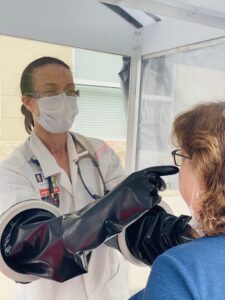
Dr. Lima demonstrates how patients are screened at the drive-up screening booth at Clearwater Valley Hospital.
Weekly update of COVID-19 from your partners in health at Clearwater Valley Hospital and Clinics
By: Dr. Ann Lima
It is hard not to think about COVID-19 (also known as SARS-CoV-2) on a daily basis, and everyone has been impacted in some way. We want to thank everyone who has sacrificed to keep our community safe and healthy. What we know about this virus and how to treat it is changing daily, and as more reliable scientific studies become available we will adapt our plans accordingly.
At the time of writing, we have yet to have a positive case in Clearwater County. We had previously diagnosed one positive COVID-19 at Clearwater Valley Hospital (CVH), however not in any residents that live in our county. The predictions on spread of virus that were made in March suggested the next 1-2 weeks would be the peak of our cases. Our goal is not to stop the virus from coming to the area, but to slow down the spread enough that it will not overwhelm our healthcare system.
We have previously increased our capacity for emergent and urgent care, and continued emergent procedures. We have separated care areas in our hospital for possible or confirmed COVID-19 patients and non-COVID-19 patients. Appropriate visitor policies restricting access are currently in place and we have structured the flow of patients in our facilities to allow for screening and distancing. We have adequate staffing and personal protective equipment (PPE), and testing for COVID-19 is available and accessible with a 2-3 day turnaround. We have a screening and triage tent, as well as a testing booth outside the emergency entrance. Provided these resources continue to be available, and after discussion with public health officials, we will be starting to return some non-emergent procedures with thoughtful and appropriate prioritization.
We continue to test using a swab in the nose and this is sent to an off-site laboratory to check for the genetic material (RNA) of the virus, and is detected only in people who are actively infected. This may be detectable before symptoms start and some institutions are testing all hospitalized patients and requiring testing prior to having procedures done. This testing can be done at the triage tent site and booth outside the emergency room entrance. We are hoping to eventually have immediate test results, but due to our low incidence (the rate of community members getting the disease) we were not first in line to get the rapid testing kits. There are also antibody tests taken from blood samples that have recently been introduced, however these antibodies take time to develop and may not be present at the time a patient is sick. These antibody tests are more helpful to see if one may have had COVID-19 disease or were exposed to it. At this point, we do not know if positive antibodies to COVID-19 mean someone will be immune to the virus in the future.
You may have heard about certain medications and their positive or negative effect on contracting COVID-19 or developing severe disease. At this point there is no cure, and no medication you can take that has been proven to effectively prevent or treat this disease. The list of unproven medications and treatments includes hydroxychloroquine, chloroquine, azithromycin, remdesivir, lopinavir-rotonavir, convalescent plasma, and other medications currently under investigation. Please continue to take medications as prescribed or recommended by your healthcare provider. Non-steroidal anti-inflammatory drugs (NSAIDs such as aspirin, ibuprofen, naproxen, etc), ACE-inhibitors (such as lisininopril, enalapril, etc) or angiotensin-receptor-blockers (ARBs such as losartan, valsartan, etc) have not been shown to negatively affect the COVID-19 disease course.
We have continued our routine outpatient care in-person at the Orofino Health Clinic and expanded our capacity for telehealth (secure video-chatting) visits for those patients in whom it is appropriate and who desire this type of appointment. During this time it is vital to manage chronic disease in order to prevent consequences and to minimize risk of severe COVID-19 disease, so please work with your healthcare provider and follow their recommendations.
Please continue to limit your exposure, especially if you are at higher risk of severe disease or could potentially infect someone at higher risk. Take care of yourself and those around you, and make healthy choices. We will learn, and evolve, and survive this together; because that is how we succeed – TOGETHER!
